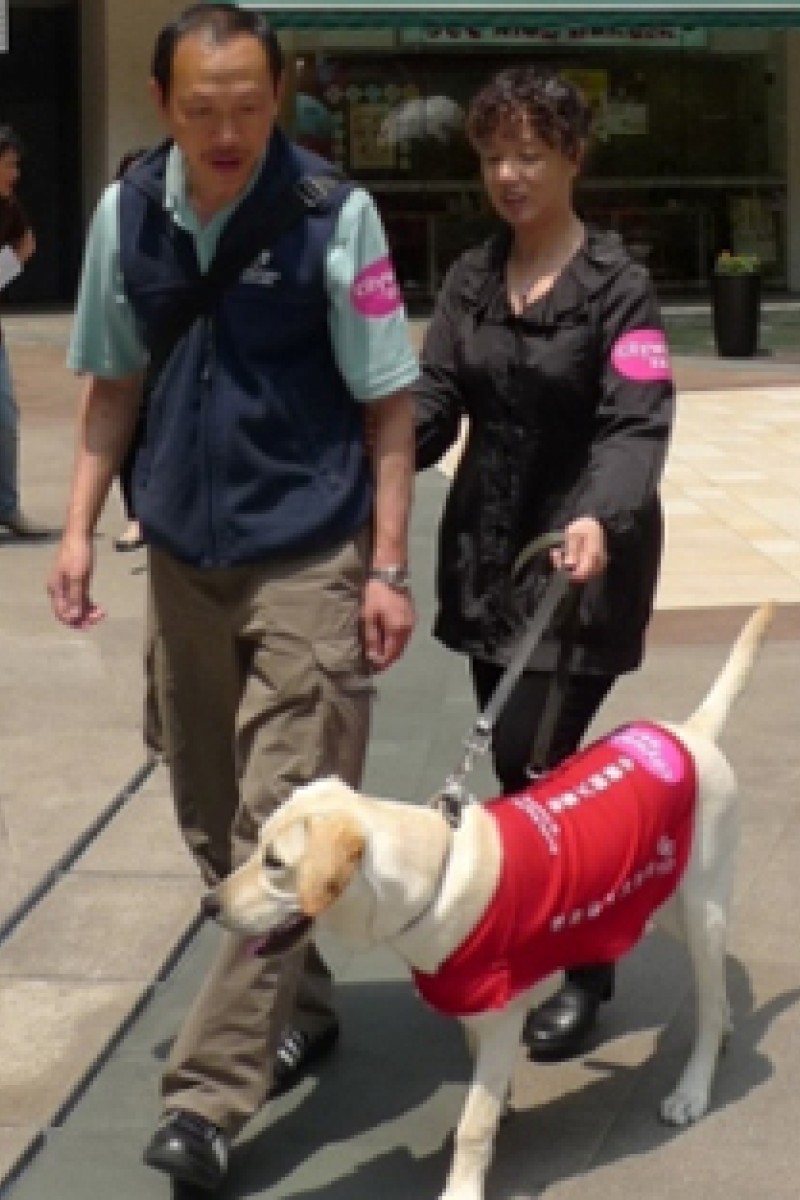 Flora Fung is given some guide-dog instructions with the labrador, Google, under the watchful eye of Raymond Cheung at Citywalk
Flora Fung is given some guide-dog instructions with the labrador, Google, under the watchful eye of Raymond Cheung at Citywalk"A cane can help me go to places, but won't help me avoid unforeseeable dangers - like falling objects, or a hole in the ground," says Fung, a part-time trainer for Dialogue in the Dark, an organisation that helps raise awareness about blind people and their needs in Hong Kong.
Once, Fung was hurt walking along a familiar street because someone had moved a bus-stop sign to another place. She walked into the sign and scratched her face. "If I had a dog, it would have stopped me, or alerted me about the danger."
Fung was born sighted and remembers seeing and touching a dog at the age of two. She was able to see normally until she was about 20, when she was diagnosed with retinitis pigmentosa. This genetic eye disease can lead to incurable blindness, but the deterioration of a sufferer's vision, until they are said to be legally blind, often varies.
"I could read using a special magnifier two years ago, but now I can't read anymore," says Fung, who can see only flashes of light. Living alone, she needs to rely on a cane to travel around Hong Kong, but says that is not good enough.
Last November she experienced what it is like to have a guide dog. She attended a two-day guide-dog training course in Kanagawa, Japan, thanks to a local radio programme.
"I learnt to instruct the dog, feed it, clean it and walk it. The training was impressive and gave me the confidence to take care of a dog."
Fung also visited a blind teacher, who goes to work using a guide dog each day. "I want my guide dog to take me to work one day, too."
After the trip, Fung applied to the Hong Kong Guide Dogs Association (HKGDA) asking for Google, the city's first guide dog since 1975. He was donated by the Taiwan Guide Dog Association, which has about 30 guide dogs, and arrived in January.
The eight-month-old labrador is now in foster care undergoing informal training at Citywalk in Tsuen Wan. Citywalk is the only shopping centre that allows a sighted person to bring a guide dog. Google's trainer, Raymond Cheung Wai-man, is a founding member of the HKGDA.
"It's important to train Google in public places because he needs to guide the blind person to visit these places in the future," Cheung says. "A guide dog is not a pet, but a working dog that needs to be trained."
When Google is 12 months old, he will receive intensive training of up to nine months to learn to become a guide dog. "After that, we will assign him to a potential partner and they will be trained together for four weeks," Cheung says. "This 'matching' period allows us to assess whether they are suited in terms of personality and daily living. If they are not, we will assign him to another person. The process will go on until the perfect match is found."
More than 50 blind people in Hong Kong are waiting for a guide dog, he says. As the service is not run on a first-come, first-served basis, there can be a long delay. A second puppy, Iris, arrived from Taiwan last month.
However, Fung believes it is worth the wait. "Dogs are different from people. They are our friends. They will always listen to you and won't think you're annoying after being with you for 24 hours ... A dog will warm my heart."
